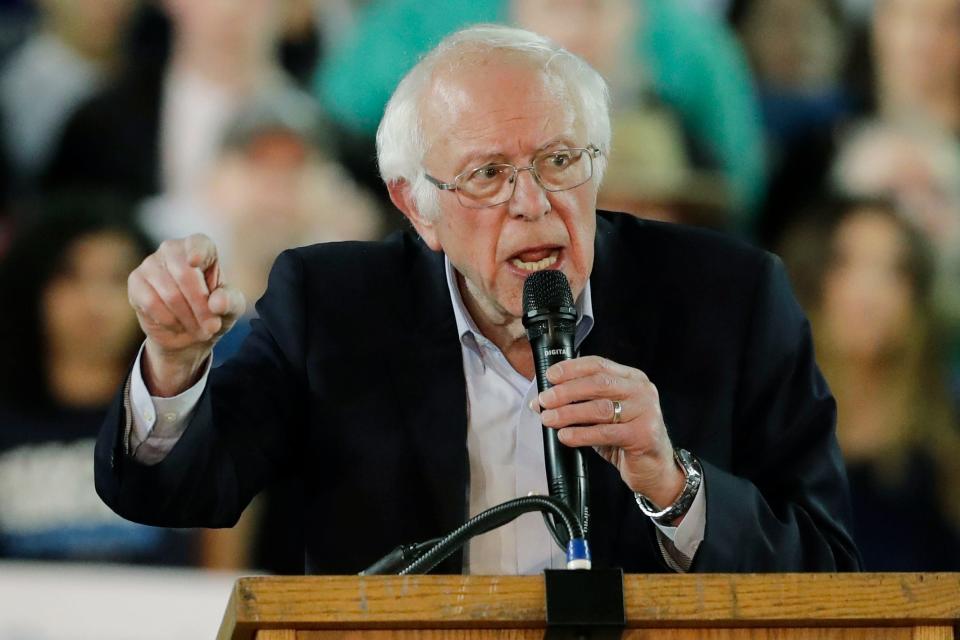Sanders 'socialism' represents a battle for the soul of the Democratic Party
Is America ready for a socialist presidential candidate? Democrats squared off on the issue Wednesday night in Las Vegas. Democratic front-runner Bernie Sanders embraced the label of “democratic socialist” and said that in many ways the country is socialist already, if you are among the wealthy. Billionaire businessman Michael Bloomberg stood up for capitalism, as did, surprisingly, Elizabeth Warren. Other Democratic candidates might prefer to self-describe as “progressive” or to avoid labels altogether, but the exchanges on stage illustrated the longstanding stresses in the party over terminology, tactics and the balance between ideology and pragmatism.
Regardless of the label, socialist ideas clearly have a home in the Democratic Party. Every candidate in the debate promoted plans that would increase government management of the economy, in some cases dramatically. And a recent Gallup poll found that 76% of Democrats would back a socialist for president. Socialism is also more popular among young people than with older generations.
But socialism is far less attractive to the American public generally; the same Gallup poll showed that 53% of Americans would oppose a socialist as chief executive. In fact, “socialist” ranked lowest of all the characteristics Gallup tested, whether age, gender, race or religion, and was the only one facing majority opposition.
'New Democrats' faction
Sanders’ critics in the party acknowledge that his ideas fire up the progressive base but they also limit his broader appeal. For example, half the Democratic voters in the New Hampshire primary thought Sanders’ policies were “too liberal.” But pollsters were asking the wrong question, since for progressives who support Sanders “liberal” is a dirty word, more appropriate for old-school compromisers like former Vice President Joe Biden. And Sanders’ backers can point out that national support for their candidate has grown while Biden’s has begun to collapse.
Sanders noted during the debate that a Wall Street Journal poll showing two-thirds of voters “have reservations or are very uncomfortable" with a socialist candidate also showed him with a double-digit lead over his Democratic opponents.

Times have certainly changed. At the end of the Cold War, it would have been unthinkable for a major party candidate to even mention socialism, except to condemn it.
Back in 1988, only 15% of voters even identified as liberal.
In that campaign year, then-Vice President George H.W. Bush tried to court centrist Reagan Democrats by tagging Massachusetts Gov. Michael Dukakis a “tax and spend” liberal. Dukakis fed the issue at first by trying to avoid the liberal label, then finally “admitting” it a few days before the election. Whether this cost Dukakis votes or not, the liberal brand emerged severely tarnished.
Democrats' Bernie Sanders problem: They are damned if they nominate him and damned if they don't
This helped give rise to the “New Democrats” faction that sought to project a more moderate image for the party. They talked up centrist “triangulation” and pursued policies that are anathema to today’s Democrats. Archetypical New Democrat President Bill Clinton backed restricting immigration, putting more police on the streets, passing broad tax cuts, restrictive welfare reform and the Defense of Marriage Act.
Then-Sen. Biden supported these policies in the 1990s and now has been forced to flee his record.
A 'socialist' vs. a 'communist'
This is the background to a recent tiff between Sanders and James Carville, the stalwart New Democrat strategist who helped put Clinton in the White House. For Carville, the Sanders campaign represents the type of threat the New Democrats had sought to prevent, an ideologically driven movement that would propel an unelectable candidate to the Democratic nomination, resulting in a rout potentially as decisive as when ultra-liberal George McGovern lost 49 states to incumbent Richard Nixon in 1972.
More on Bernie: Sanders was ridiculously naive about the Soviet Union. The Trump ads write themselves.
Carville said he is “scared to death” of the ideological drift of the party, remarking “it’s like we’re losing our damn minds.”
Sanders clapped back that Carville was a “political hack,” and Carville embraced the term, saying he is “not an ideologue” or a “purist” and adding, perhaps unfairly, “at least I’m not a communist.”
In this respect, Carville was echoing President Trump, who said in a pre-Super Bowl interview, “I think of communism when I think of Bernie."
Michael Bloomberg also brought up communism in the debate Wednesday, which Sanders called a “cheap shot.”
Sanders responded to Trump that “obviously” he was not a communist and added maybe the president “doesn’t know the difference.” But does it really matter if the president can summarize the fine points of political theory distinguishing two varieties of far left-wing ideology?
This is hardly a winning issue for the Democrats. If the November election comes down to debating whether Bernie Sanders better fits the definition of a socialist or a communist, the Trump campaign has nothing to worry about.
James S. Robbins, a member of USA TODAY's Board of Contributors and author of "Erasing America: Losing Our Future by Destroying Our Past," has taught at the National Defense University and the Marine Corps University and served as a special assistant in the office of the secretary of Defense in the George W. Bush administration. Follow him on Twitter: @James_Robbins
You can read diverse opinions from our Board of Contributors and other writers on the Opinion front page, on Twitter @usatodayopinion and in our daily Opinion newsletter. To respond to a column, submit a comment to letters@usatoday.com.
This article originally appeared on USA TODAY: Sanders 'socialism' represents different ideologies in Democrats

 money
money 